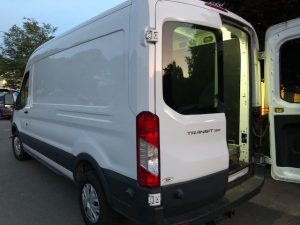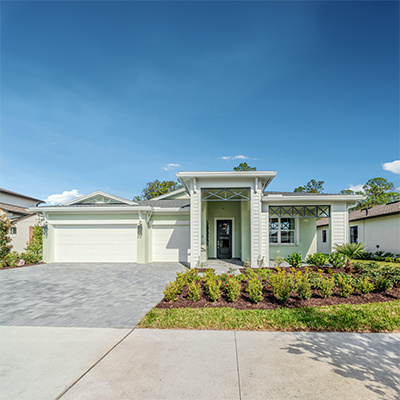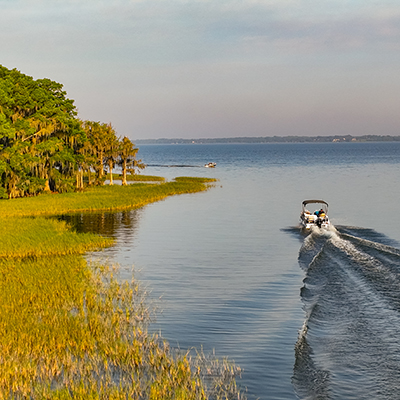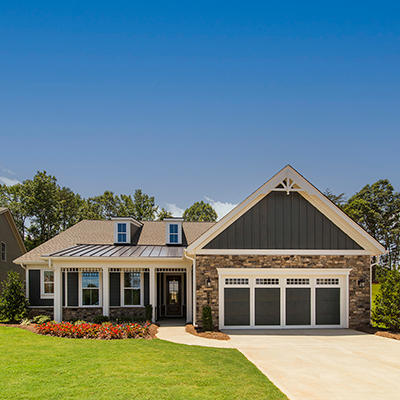VanLiving in Retirement
Category: Adventurous retirement
June 3, 2018 — A lot of Americans, including retired baby boomers, are thinking… small. As one example, our last visit to the barbershop was spent listening to the young guy in the next chair talk about the tiny home he is building. Everyone in the shop was fascinated with the unique touches and hi-tech stuff he was putting into it. In mid-May we reported on the boat that John is building for his retirement home, Next Chapter…Afloat. Yet another aspect of the think small movement, and the topic of this article, is the notion of discarding the notion of the RV, and replacing it with a customized luxury van – Vanlife, or Vanliving!
If the mobile lifestyle appeals to you, your thinking up to this point was probably limited to RVs (see our “Living the Mobile Lifestyle” series by Betty Fitterman). Now, enter the customized van, another option with many similarities and advantages shared by the tiny house movement.
Here are some of their advantages:
– Smaller initial costs. Even the most luxurious Mercedes-Benz Sprinter models are far less expensive than a giant RV, some of which are as large as an intercity bus and can cost hundreds of thousands of dollars. At the other end of the scale, you can buy a used van and self-customize on a very small budget.
– Lower operating expenses. Vans get pretty good fuel mileage, sometimes comparable to a big SUV. And they don’t need specialists to work on them like RVs do.
– More portable and easier to drive. Most RVs are well… big. Not everybody feels comfortable driving one. They get rocked by the wind and visibility can be tough. Worse, once you guide it into its spot for the night, you won’t want to take it out for a spin to the local restaurant or movie. You can avoid that hassle by towing along a car behind your rig, but that also adds to the degree of driving difficulty.
– Live without a permanent home and save big. For a retired person on a very limited budget, living in a van for part of the year, or even full-time, offers a way to enjoy a richer lifestyle. Snowbirds will find it cheaper than owning or renting a second home, more flexible, with the benefit of almost unlimited travel.
Limitations
– If you are truly living in your van for extended periods of time, vans are small places. Although you can usually stand up in many models, many do not come with indoor plumbing. Except in the biggest models, you are not going to have much room to stretch out, and you won’t want to spend a lot of time inside it.
– This is not a viable lifestyle as you age. Life on the road can be challenging. And driving to place to place in a big vehicle is not for someone whose driving skills are not tippy-top.
A gearhead’s playground
If you read some of the articles online or watch Youtube videos you will quickly see that people who love gear and tech stuff will find heaven in a van (see Youtube video below). The equipment you can buy is just amazing – solar panels, storage batteries, magic fans, electrical equipment, A/C heating units, etc. All of this equipment is designed to give you the creature comforts to put your home on wheels, all the while completely disconnected to the grid.

What are the best vans for extended living?
There are several choices if you decide on a do-it-yourself conversion:
Ram Promaster
Ford Transit
Mercedes Sprinter
Chevy Express
Nissan NV
New vehicles like these start in the high $20’s (Van Promaster) and range to the low $40’s (Mercedes Sprinter) – before customization. Models are generally available with longer wheelbases, engine options (including diesel), extended roof heights, 4WD, and loads of other options. Fully loaded they can go over $100,000 – before you get it fitted out with the necessities of living. Generally the vehicle manufacturers do not sell camper versions, you go to the aftermarket for that. Of course there is an active used market and that is usually where the thrifty can find great bargains. See this Youtube vehicle to see how only a little money will buy you this dream – if you are handy and resourceful.:Tom retired to a converted F150 Ford van . You can outfit a van yourself for less than $10,000 if you are thrifty.
Think you’ll ready to become a Vanlifer?
–
– Research is fun. Once you start searching online for vanlife and vanliving you might get addicted to all the information available. Youtube has all kinds of videos, fan-sites have articles galore. You will learn a lot quickly, and it will be useful.
– Living on the road . Of course there are state and national parks where you can tie up your van and live the good life. RV parks are usually inexpensive and have many amenities. Walmart and some other big box stores welcome you overnight to their parking lots. But just parking your van along the road, at a rest stop, or in a friend’s neighborhood can be tricky. Fortunately there are plenty of resources to help you find out safe and inexpensive options. Search on “boondocking” in a van to find out more.
More fun information
I retired to travel the country
Boomers Embrace Luxury Van Life – WSJ
Comments? Have you thought about buying or customizing a van for your retirement? Did you consider an RV instead? Please share your experiences and thoughts in the Comments section below.






Comments on "VanLiving in Retirement"
Doug says:
The best single web source for cheap, nomadic vehicle living information is www.cheaprvliving.com. They also have a YouTube channel by the same name. There are many vehicle conversions on these sites to review. These include: vans; utility trailers; schoolies (retired school busses both small and large); and, box trucks (bread trucks and former U-haul trucks).
Mary says:
Would like to see articles about vehicle retirement living address the question of security. It seems like vehicles would be far less safe to live in than buildings, but I don't know for sure since I don't see the issue brought up.
JCarol says:
Sorry - but watching this video left me cold, and not because I can't embrace the concept of tiny living.
It's hard to understand why one would pay $80K - $100K for a reinvention of the wheel, no pun intended. RV manufacturers have all but perfected the manufacture of tiny houses on wheels, including all-in-ones with roughly the same size footprint, but at a much lower cost along with better layouts and features.
If the best way to utilize space is to stow a portable toilet in a kitchen cabinet under the sink and microwave, it seems clear that the living area is at least eight square feet too small. Talk about a massive yuck factor on more levels than any of us want to ponder. Even a dog innately knows better than to poop where he eats.
Jennifer Lee says:
Hi JCarol
I felt the same way--too claustrophobic and the price is outrageous. Vehicles like this can only decline in value over time. This appears to be a flash in the pan for a small segment of people even interested in living full time in a van.
Doug says:
Expensive? I guess it could be if you buy a $150,000 Roadtrek or a $120,000 Winnwbago Class B self-contained van. Most people doing this as an alternative way of living are spending $5,000 to $10,000 to both purchase a used vehicle AND construct a simple living quarters. It is very cheap living accommodations. You can buy a used 40 ft. long schoolie for $5,000 or less and spend $10,000 to remodel the bus and have a fully contained home with fresh and waste water holding tanks; a shower and sink; solar panels, batteries and power inverter; dedicated bedroom; dedicated dinette table; and, a sofa. To make the cost reasonable, however, you must do the conversion work yourself.
If one spends very little for the vehicle, there will be little to no depreciation. The financial risk is limited to the conversion budget. This is nothing compared to the housing market downdraft of 2007-2010. Furthermore, there's always more financial risk purchasing a house in a retirement or vacation area versus purchasing a house in a mixed neighborhood.
JCarol says:
Doug, I was referring specifically to the Mercedes conversion featured in the blog topic. As an RV recreational camper who is not a full timer, I'm well acquainted with (and quite admiring of) the remarkable DIY conversions that people build with low budgets and great skills. Their results offer great livability at a terrific price.
Despite wishing it were otherwise, most retirees haven't the combination of talent, confidence, stamina and inclination needed to convert old school buses into living quarters. For them, used RVs are easy to find, reasonably priced, and include the amenities you listed above.
You and I would surely agree that when considering full-timing, particularly if boondocking, a few creature comforts (like a dedicated bathroom and indoor shower) become extraordinarily important. A little more space, as in the schoolie you described or a smallish RV, will also go a very, very long way.
Not to speak for Jennifer Lee, but my impression of her comment was that expensive conversion vans like the Mercedes will depreciate drastically and have narrow appeal. I agree.
Doug says:
JCarol, When I made my expensive comment I was also referring to Mercedes-based Roadtreks and Winnebagos. I also own a recreational RV (Class A) not used for full-time living. Bought it used to not incur as much depreciation. That said, the segment of the current RV market that is not experiencing large depreciation is the small RV market, namely the Mercedes-based Class B vans and Class C's on cutaway chassis. They are expensive but not depreciating rapidly because they are in such high demand at this time. One Mercedes-based manufacturer's units take 9 months to get from order to delivery. It's used market reflects little depreciation in late model units.
Jennifer says:
JCarol you are correct in the interpretation of my comment. Sorry I was not more specific.
JCarol says:
Gotcha, Doug, and agree completely. To avoid a huge initial outlay and subsequent depreciation we bought a used 5er and a used diesel truck to haul it. Both were in excellent condition and have given us no trouble.
I agree on the smaller Class B & C RVs being in high demand and likely to remain so, but those are a whole different kettle of fish from the small van conversion discussed in this article.
Happy camping, my friend!
Admin says:
Have you Rv'ers heard of Harvest Hosts? They have a website and have free overnight stays at farms, vineyards,museums and all kinds of fun venues for one night only. These are small businesses that are trying to attract visitors. It would be a fun way to see the country as there are hundreds of places --they have a map of the USA on their website. Many are in out of the way places. There are a few rules about etiquette and cleanliness while staying overnight, but that would just be good manners no matter where one chooses to stay. Below is the link.
https://harvesthosts.com/
Imelda says:
We loved Harvest Hosts so much we purchased a lifetime membership during our 1st year of membership. They have now been purchased by a new owner but that’s not a bad thing. The new management has added 360 golf courses. Can’t wait to start up again in April (we rent out West each Winter for skiing) and enjoy additional ‘free’ overnights as we travel.
Doug says:
Also: boondockers welcome and freecampsites.net. Military bases have campgrounds if you're former armed service personnel. Corps of Engineer Campgrounds and state parks are reasonably priced. There are many resources to locate free or low cost overnight campsites.